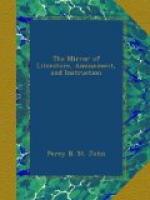The inner, or second and third folios of the paper, present still finer studies for our reflection. The eye almost instinctively lights on the “Foreign Papers,” detailing the progress of war and the balance of power—Francfort Fair, and English manufactures. Below is the well-known graphic relief—a clock, and two opened and one closed book, with “The Times”—past and future, decorated with oak and laurel. Then come the theatrical announcements teeming with novelty and attraction, which stand like the sauces, savoury dishes, and sweetmeats of the day’s repast.
(To be concluded in our next.)
* * * * *
OLD POETS.
* * * * *
(To the Editor of the Mirror.)
The following song is said to be the most ancient in the English language, and to have been written so early as the year 1250, almost a century before Geoffrey Chaucer, (who is styled the father of English poetry,) produced his Court of Love, which was written at the early age of eighteen.
CHAS. COLE.
THE CUCCU.
Summer is icumen in;
Lhude sing cuccu:
Groweth sed and bloweth med,
And springeth the wde nu
Sing cuccu.
Awe bleteth after lomb;
Lhouth after calve cu:
Bulluc sterteth,
Buck verteth,
Murie sing cuccu,
Cuccu, cuccu,
Wel singes this cuccu;
Ne swik thu naver.
Glossary—Sumer, summer—icumen, a coming—lhude, loud—sed, seed—med, mead—wde, wood—nu, new—awe, ewe—lomb, lamb—lhouth, loweth—cu, cow—murie, merry—singes, sing’st—thu, thou—Ne swik thu naver, May’st thou never cease.
* * * * *
MANNERS & CUSTOMS OF ALL NATIONS.
* * * * *
MAY DAY.
It would seem that among our Pagan ancestors, before the introduction of Christianity, the first day of May was the great festival in honour of the sun, and that fires were then kindled and rejoicings made, in honour of that great luminary. The first day of May is still called Beltan, or Baal-tein, “the fire of Baal.” In some parts of the country the shepherds still make festivals of milk and eggs on that day, but the custom is rapidly declining. In the Highlands the festival is still continued with singular ceremonies. On Beltan day all the boys in a township or hamlet meet in the moors; they cut a table in the green sod, of a round figure, by casting a trench in the ground of such circumference as to hold the whole company; they kindle a fire, and dress a meal of eggs and milk of the consistence of a custard; and then knead a cake of oatmeal, which is toasted at the embers against a stone. After




